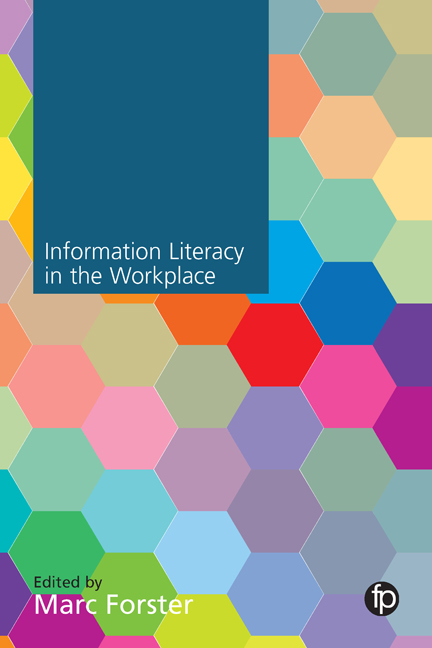Book contents
- Frontmatter
- Contents
- Figures and tables
- Contributors
- Foreword
- 1 Information Literacy and the workplace: new concepts, new perspectives?
- 2 How is Information Literacy experienced in the workplace?
- 3 Information Literacy and the personal dimension: team players, empowered clients and career development
- 4 From transaction to transformation: organizational learning and knowledge creation experience within Informed Systems
- 5 Virtuality at work: an enabler of professional Information Literacy
- 6 Determining the value of Information Literacy for employers
- 7 Information Literacy's role in workplace competence, ‘best practice’ and the ethics of professional obligation
- 8 Learning within for beyond: exploring a workplace Information Literacy design
- 9 Developing information professional competences in disciplinary domains: a challenge for higher education
- 10 The ‘hidden’ value of Information Literacy in the workplace context: how to unlock and create value
- 11 The ‘Workplace Experience Framework’ and evidence-based Information Literacy education
- References
- Index
10 - The ‘hidden’ value of Information Literacy in the workplace context: how to unlock and create value
Published online by Cambridge University Press: 08 June 2018
- Frontmatter
- Contents
- Figures and tables
- Contributors
- Foreword
- 1 Information Literacy and the workplace: new concepts, new perspectives?
- 2 How is Information Literacy experienced in the workplace?
- 3 Information Literacy and the personal dimension: team players, empowered clients and career development
- 4 From transaction to transformation: organizational learning and knowledge creation experience within Informed Systems
- 5 Virtuality at work: an enabler of professional Information Literacy
- 6 Determining the value of Information Literacy for employers
- 7 Information Literacy's role in workplace competence, ‘best practice’ and the ethics of professional obligation
- 8 Learning within for beyond: exploring a workplace Information Literacy design
- 9 Developing information professional competences in disciplinary domains: a challenge for higher education
- 10 The ‘hidden’ value of Information Literacy in the workplace context: how to unlock and create value
- 11 The ‘Workplace Experience Framework’ and evidence-based Information Literacy education
- References
- Index
Summary
This chapter will discuss:
• how there are many knowledge workers in the business world who are not traditionally considered information professionals but use information as part of their day-to-day work.
• how information professionals might play a business-driven, strategic yet pragmatic role in the enhancement of the Information Literacy (IL) capabilities of knowledge workers of all types and levels.
Introduction
The job titles of information professionals are numerous and varied: from strategist, information/knowledge manager, intranet/internet manager, professional support lawyer, to CRM administrator, researcher, analyst, marketing and communication manager, product manager, training manager and many more. In this chapter, information professionals are defined as those key employees of whatever label who consciously consider how best to help the company leverage information and/or create information systems, service and marketplace to create value for their employees, clients or business stakeholders. There are many knowledge workers who are not traditionally considered information professionals but use information as part of their day-to-day work.
As the advancement of technology empowers all knowledge workers with affordable digital tools at their fingertips, information professionals are increasingly providing coaching and training services on the effective use of information systems (where the information is stored) or communication tools (where ideas and information are exchanged). They offer advice on how to create, share, search, organize, visualize, analyse and present information. Simply speaking, they show themselves to be those pivotal individuals who introduce ‘Information Literacy’ to the workplace context.
So how important is IL in the workplace context? This chapter examines knowledge workers in different roles, functions and levels, who work under different operating models and company cultures, to understand if and when IL adds value to the business, and if it does, how might information professionals play a business-driven, strategic yet pragmatic role to enhance knowledge workers’ IL capabilities.
- Type
- Chapter
- Information
- Information Literacy in the Workplace , pp. 131 - 148Publisher: FacetPrint publication year: 2017
- 7
- Cited by

